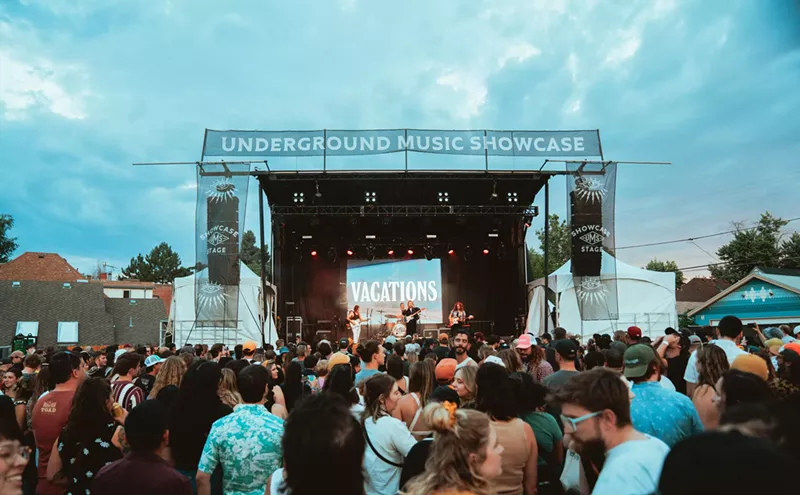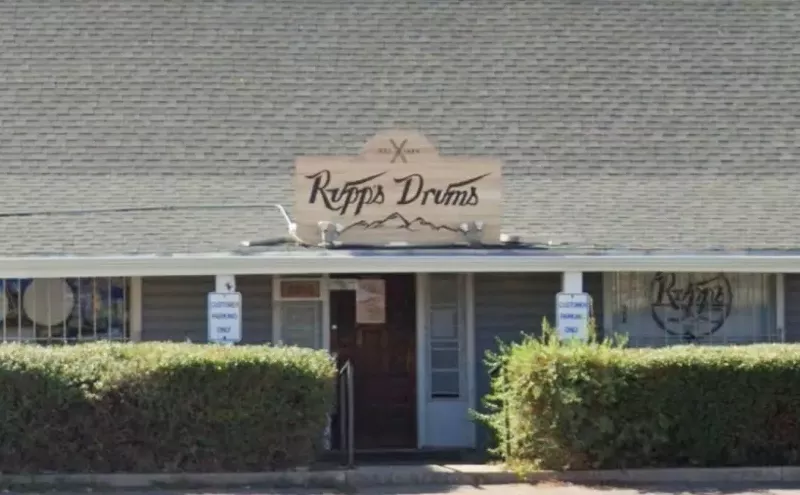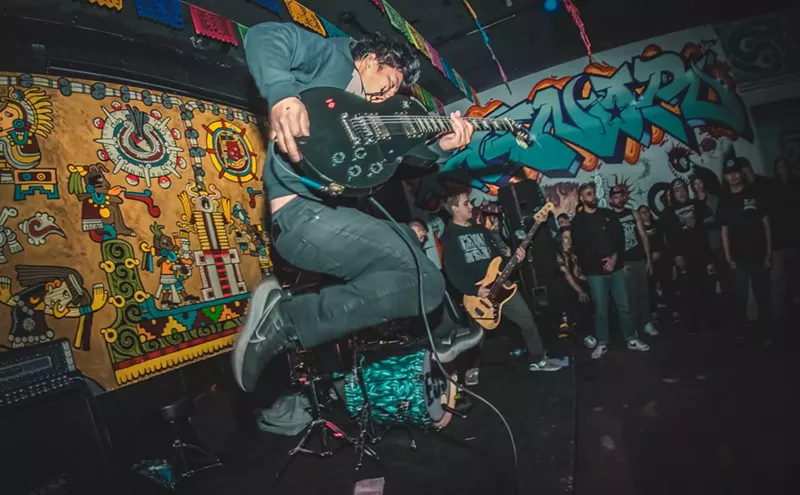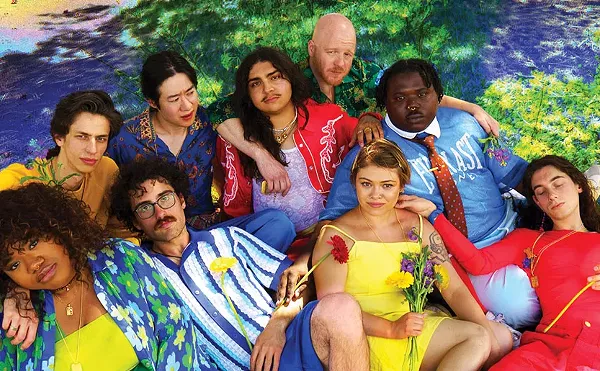Westword (Tom Murphy): What was it about the Exploding Hearts that made such an impression on you?
Kip Berman: I don't know, I think the most important thing was that the songs were so catchy. It was one of those bands that Alex [Naidus] and I bonded over before playing music together. I lived in Portland for a while. They're so much a part of that city I loved. Musically they were right there at the top of things--they embodied everything good about music. It wasn't the way they dressed, they wrote these pop songs that were so engaging and played them so passionately--totally 100%. It was so immediate. There were a lot of bands in Portland then that were pop or indie pop or indie rock but I can't think of any bands that were as immediate, poppy, incredible or as joyful as the Exploding Hearts. They were really genuine and pure.
WW: And you got to see them perform live?
KB: The weird thing about that is that I didn't, ever. Which is strange because I really liked them and bought their record. I just thought, "Oh, I'll go see them next time." I feel like such an idiot. They opened for the Buzzcocks and I didn't go to that. There was this band called Dear Nora I saw about twenty-seven times. I really liked The Hunches. For some reason I never saw the Exploding Hearts perform live and I can't figure out why because I lived in the same city they were from. I remember buying every seven-inch when it came out but never saw them live.
When I met Peggy, she was a huge Dear Nora fan as well. She grew up in the South, in Louisiana and I thought I was the only one. They were a local band and played house shows and it was the first immediate experience I could go to. I didn't know that people outside Portland knew about Dear Nora. It was something Peggy definitely bonded over--MP3s of old Dear Nora demo tapes and singles, going, "This is my favorite song, no, this is my favorite song."
It was cool to find someone who grew up so far away from where I lived but was still into something so kind of bizarrely small that I was into. Their early sound was more like K Records, immediate pop stuff and their later stuff was more mature. It's all good stuff. I wasn't twenty-one yet when I first started going to see them so I really got into them more because I couldn't go see, like, Yo La Tengo because they play twenty-one plus shows. The DIY indie pop stuff was more accessible to someone my age.
WW: There's a great, melodic tension in the riff about two thirds of the way through "Tenure Itch" that reminds me of early Lush and later-era Smiths. How would you describe your guitar sound and what inspired that style of playing?
KB: The weird thing about "Tenure Itch" is it was one of those songs where I thought it was supposed to sound like...You know that band the Crystal Stilts, I love them and I'm really into them. The way I play guitar on that song has a dronier feel than a lot of the stuff on the album, which is a lot more power chords and full chords. It was a lot more deliberately sparse in terms of the strumming. When I started writing it, it sort of sounded like a Crystal Stilts. I don't think it did in the end but I think the initial impetus was an open chord and clanging guitar riff and I worked with a single note, not droning like Galaxie 500. More using a weird open chord drone and then kick in with a really poppy chord, getting a lot of notes out of one riff.
I don't know how to describe guitar playing, I'm not that good at guitar. I'm not very technical and I play a little heavy-handedly and enthusiastically. I'm not good at arpeggios and stuff like that.
WW: I was curious about that song because it sounds really different from the rest of the songs on the album.
KB: It really does. It was one of the later songs we wrote for the album. The album was written to maybe be released as EPs and singles. But then stuff like that song "Stay Alive" and "Tenure Itch" and "Young Adult Friction" are the later songs that we wrote. Whereas "This Love is Fucking Right!" is really early. "Come Saturday" was toward the early side. The later ones were more developed in terms of how guitar and rhythm worked. When we started we had a drum machine so all the songs had kind of the same drum beat and we only knew how to program one or two drumbeats. But since Kurt [Feldman] has joined, it really opened up different feels in our music. We really don't write songs by jamming but for whatever reason when he started playing that drum beat, I started playing chords over it and it sounded totally swanky. It was very different from the rest of our songs that have that "chug chug chug" kind of sound.
WW: Has anyone told you there's a very Manchester feel to your songwriting?
KB: That's the funniest thing because I was just talking about "Stay Alive" and I know there's a lot of different Manchester beats, but we always used to joke that our drum beat was the "Manchester Beat." We used to call that song "The Velocity Girl" song after the song "Forgotten Favorite." That song in particular had kind of a Stone Roses feel to it--maybe not so much the choruses, which are big, but more the dangling guitar line that wraps around itself and never stops. You know those stupid things that kids do where you use your middle name and the street you grew up on to get your cool rock and roll name or porn name, I grew up on Manchester Court. I was so psyched about that because a lot of my favorite bands were from Manchester.
Obviously I liked the Smiths and New Order. But I also loved Oasis. Do you know who we got to meet in England? Tim Burgess from the Charlatans. He had us come down and play and hang out and he's one of the nicest guys ever. People from Manchester told us he's the second most famous person in Manchester ever, behind Morrissey. He's a genuine guy who likes to support new bands. He's been in bands for twenty years and he still gets psyched to go see other bands play. It was really cool to see. Like when we went on tour with the Wedding Present.
It was our first major tour and we were the opening band. Getting to see them up close, the seriousness and professionalism they put into it, at the same time how good their shows were and how much their fans love them. Some of them are literally the same fans they've had for the last twenty-five years or almost thirty years. It's literally seeing guys that could be my dad showing up looking completely normal and when they play, jump around and sing along to all the songs.
It was so cool and really heartening and a good example for a young band like ours to see a band doing that for so long and so well and they never had to change what they were about. It was a cool educational experience and a cool bunch of shows to see. I don't want to sound cynical but I don't know how many bands today twenty-five years from now are going to command a room full of people and get them to go berserk. And it has nothing to do with their egotism or pretension, but a testament to solid songwriting.
The thing with David Gedge, the songs speak for themselves. Lyrically, you can relate to them, it could be about your own life. The reason people like him is because he likes people. He's not like, "I'm different from you, I'm a pop star, I'm special." He's more like, "I like to write songs, and I hope you like them." In America, they're pretty much a cult band. People know who they are but in England they have a really rabid, devoted following. They like to get wasted and have a visceral experience at the shows. It's rare that a band has more than three seven inches. The Wedding Present has been making music consistently for the last twenty-five years.
WW: Correct me if I'm wrong, but in pictures of live performances I've seen, you play what looks like a Fender Jazzmaster. Why that particular guitar and what kinds of equipment setup do you use when performing and recording?
KB: It's actually a Jaguar. They're really similar guitars. My roommate has a Jazzmaster. The only thing I can tell that's different is that the pickups are a different shape. The Jazzmaster has those big, square, blocky ones and the Jaguar has the narrower ones.
I chose the guitar because it's pretty. I can talk a little about what I use but I preface anything I say, and I know it's cliché to say this, but you can be in an awesome band have shitty equipment and you can have really good equipment and have really mediocre songs. Even though it's kind of fun to obsess over music equipment and talk to other people in bands about what pedals and guitars they have but at the end of the day it doesn't really matter as much as people in bands think it does.
I like my Fender Jaguar a lot but I don't know other people who use them. It's white, it's pretty and it sounds cool and I use it with heavy fuzz and it sounds good with that. I use a solid state amp--a Roland JC120. It's not a fancy, boutique tube amp, it's something you can get used for around three hundred dollars and it's louder than you'll ever need even if you just turn it up to one. It has a thick sound and I love it.I don't even use many pedals.
Earlier you mentioned how my band was compared to shoegaze bands. I just use a fuzz pedal, an overdrive, a tuner and a reverb pedal and that's kind of it. I do use a pedal a friend made me because it looks kind of like a rainbow. I don't even have delay or chorus pedals but I do want to get one soon. But live I usually just play dry or overdriven. The JC120 has a famous chorus sound but the chorus on my amp is broken. I use a Boss RV-5 or something and one of the settings is called "Modulate," which gives the reverb a chorusy sound.
There are bands that definitely utilize guitar effects to amazing ways, like A Place to Bury Strangers. They push the boundaries of sound and they make their own pedals. It's not like they go to the store and buy them thinking, "I'm going to buy a pedal that sounds cool." They think, "I'm going to build a pedal that sounds cool" and make sounds no one's ever made before. That's amazing. I definitely don't want to get across that people shouldn't care about the equipment they have or try to discover the right sound. It's just for me that I don't use much fancy stuff and I feel like it would get in the way of me. I don't even know how to play guitar like the Edge. I don't know how to do that delay thing that sounds like infinity. It's kind of beyond me.
It sounds like a back to basics, fundamentalist approach and I'm always suspicious of any kind of fundamentalism like, "We've just got to get back to rocking and what rocking is always about." That kind of mentality is really played out and invokes that sort of idea that everything was good in the 1960s and it only got worse and worse and no good music has come out since then. That's not true and I feel like every era is the golden age of music when you think about it and you consider what was coming out whether it's 1987 or 1997. There've always been incredible bands making music that was worthwhile.
WW: In "Stay Alive" there's something that sounds like the strike of a crystal chime. What is that and how did you accomplish such an interesting, yet simple, sound?
KB: That's a keyboard. My roommate likes naming keyboard sounds. The terms "Christmas Synth" and "Disney Synth." I'm not sure how to describe that but maybe you'd recognize it from a movie. Like the band Scritti Politti uses a bit of "Disney Synth." That sound is pretty similar to the keyboard sound in "Teenager in Love" - it has a chimy, bell sound. It gives it an interesting texture. In most of our songs the keyboard has long, sustained notes and fills up space. In that song it's a little more clinky and serves as a kind of counter melody. It gives it sort of a John Hughes, magical feeling.
I know he gets referenced with every band like, with M83 "This album is really influenced by '80s, teen, coming of age drama." I'll say that too, it sounds like teen drama, a little bit.
WW: I thought it was both texture and percussion at the same time.
KB: Yeah, that's the thing. It's literally a bell or xylophone sound where it actually is a percussive instrument and yet melodic. Piano is a percussive instrument, an organ is less so and a harpsichord is a percussive instrument. I'm a sucker for any song with harpsichord in it like in a Kinks song or Belle and Sebastian. It's really short notes because a harpsichord plucks the string instead of striking them. Our keyboard parts are more an organy sound.
WW: You've mentioned working in a call center in that interview with Tripwire [published February 17, 2009]. I spent 10 years altogether in call centers. Did that experience inform your music or how you do things these days in any way?
KB: Was it inbound or outbound?
WW: It was both.
KB: I worked at an inbound call center but an outbound call center where you're cold calling people is probably the worst thing on earth. I think the drummer for Glass Candy worked in a call center too. It literally makes you appreciate every moment you're not working in a call center. I've had a headset on my head for longer than I'd like to admit so I feel really grateful than I don't have to do that. Some people complain about how touring is hard but working in a call center at four in the morning sucks. Nothing really sucks more than that. Don't ever complain about anything else in life because you could be working in a call center.
It made me want to play music more than working in a call center, that's for sure. That's what that song "Contender" is kind of about. My life sucked and I was working in a call center doing nothing and the Exploding Hearts rocked and here I am sitting in my messy room and going nowhere, being a loser. It definitely informed my motivation to do anything other than be in a call center. I'm really happy to work hard at anything so long as it doesn't involve having a headset on my head. But then it comes full circle when we become like Madonna and other superstars of international pop where we're doing all the choreographed dance moves and we have the headset pieces.
So yeah, I do have some experience with that kind of thing, not the dancing so much but wearing the headset. I look back on that period of my life and think, "Man that sucked." But I'm really just grateful that I don't have to do that anymore. "Oh, it's an eleven hour drive from Chicago to Toronto today but at least I'm not at a call center." It definitely gave me a good perspective on things.
WW: In that Spoonfed interview (published May 8, 2009) you mentioned enjoying the candy and other goodies in countries outside the US. What have been your favorites so far? If you haven't been to Asia, especially Japan, you're in for a real treat, no pun intended.
KB: I've never been to Asia but the thing is I don't want to badmouth homegrown candy and snack foods. As a patriotic American I've had the opportunity to experience other cultures' candy, snack food and potato chips and it really is eye opening--especially the variety of Haribo gummy candies in Europe. In America you think, "Oh we've got gummy bears, cherries, peaches." In Europe they have gummy bananas and all sorts of stuff like Haribo Smurfs. The people in my band have different tastes but I'm basically into gummy candy myself. But in terms of potato chips, which isn't my forte, England probably has the top potato chip flavors like Rosemary Chicken and all sorts of stuff where it's not really like a potato chip anymore but a full blown meal.










